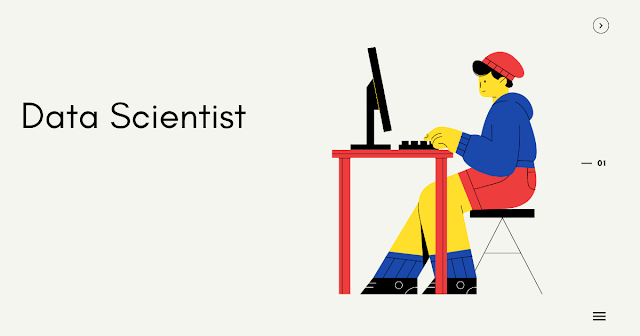A data scientist is a specialist who gathers, examines, and interprets astronomically vast amounts of data. The position of a data scientist is a spin-off of a number of conventional technical roles, including those of scientist, statistician, computer professional, and mathematician.
Advanced analytics tools, such as machine learning and predictive modeling, must be used for this job. A data scientist needs a lot of data to create hypotheses, draw conclusions, and assess market and customer trends. In order to find patterns, trends, and linkages in data sets, primary duties include collecting and analyzing data using a variety of analytics and reporting technologies.
To mine big data for information that can be used to forecast customer behavior and find new income opportunities, data scientists often work in teams in the corporate world. In many businesses, data scientists are also in charge of establishing standards for data collection, data analysis, and data interpretation.
As companies try to extract meaningful information from big data, the enormous amounts of structured, unstructured, and semi-structured data that a large corporation or the internet of things produce and gather, the demand for data science skills has grown substantially over the years.
What is The Importance of Data Science?
Data science is a highly interdisciplinary discipline that encompasses a wide range of information and typically considers the big picture more than other analytical disciplines. Data science is used in business to provide information on customers and marketing initiatives, as well as to assist organizations in developing effective strategies for attracting customers and increasing product sales. Big data, which refers to the vast amounts of information gathered through various collecting procedures, including data mining, force data scientists to rely on original insights.
Big data analytics can assist brands in understanding their consumers, who ultimately contribute to a project or business's long-term success. Data science may assist businesses in managing the tales associated with their brands in addition to helping them target the proper audience. Big data is a sector that is expanding swiftly, therefore there are always new tools accessible. These technologies require professionals who can quickly learn how to use them. Companies that want to attain goals based on study rather than just intuition can work with data scientists to develop a business plan.
Data science is crucial for security and fraud detection because it allows for in-depth analysis of vast amounts of data to spot minute discrepancies that may indicate flaws in security measures. Highly personalized user experiences made through personalization and customization are propelled by data science. The analysis can be utilized to help a business make its customers feel noticed and understood.
Data Science Can Be Divided Into Six Major Areas. What Are They?
Multidisciplinary investigation:-
Data scientists employ a variety of techniques to gather massive volumes of data while taking into account vast, intricate systems with interconnected parts.
Data Models And Methods:-
To choose the methods that will model their data the most effectively, data scientists must rely on experience and intuition, and they must continually modify those approaches to focus on the insights they want.
Pedagogy:-
Data scientists must collaborate with businesses and clients to choose the best philosophies to use when gathering and examining information about their clients' customers and goods.
Using Data to Compute:-
The most important factor all data science projects have in common is the requirement to employ tools and software to assess the related algorithms and statistics due to the magnitude of the information pool they are working with.
Theory:-
Data science theory is a dynamic, complex field of study with a wide range of applications.
Evaluation of Tools:-
Data scientists may modify and analyze enormous amounts of data using a variety of tools, so it's crucial to continually assess their efficacy and keep testing new ones as they become available.
The History of Data Science:-
The majority of data science is a subfield of computer science. The word was originally used in 1960 by computer science pioneer Peter Naur. In his 1974 book Concise Survey of Computer Methods, he discussed the fundamental elements of the methods and techniques utilized in data science. During its summit in 1996, the International Federation of Classification Societies used the phrase "data science." In his paper "Data Science: An Action Plan for Expanding the Technical Areas of Statistics," written in 2001 for the International Statistical Review, computer scientist William S. Cleveland established the field of data science. It changed and developed over time to become the most popular, quick-paced research methodology in contemporary technology.
For positions where data science work is performed as a significant element of the job, the Office of Personnel Management (OPM) for United States federal agencies recently approved agencies to use a parenthesis of (data scientist) along with the occupational title. The OPM has established that occupations in epidemiology, actuarial science, operations research, statistics, and information technology are just a few of the occupational series where data science work may be found. The Census Bureau's data scientists are supported by the Center for Optimization & Data Science, which also highlights their expertise in adaptive design, data analytics, and machine learning for other government organizations.
Conclusion:-
Data science is the future of data-driven businesses and organizations. With this, comes a lot of responsibility – not only to get the best out of data but also to make sure it is used in the right manner.
There are many new trends or tools that can help you improve your writing and communication skills and become a better writer as well. Depending on your needs, it might be smart to train yourself in one or more areas before applying for data scientist job interviews. Hope our post made things easier for you.
More Article:- Marshall Thundering herd, Samsung M51, Black Cat, First Love


Post a Comment